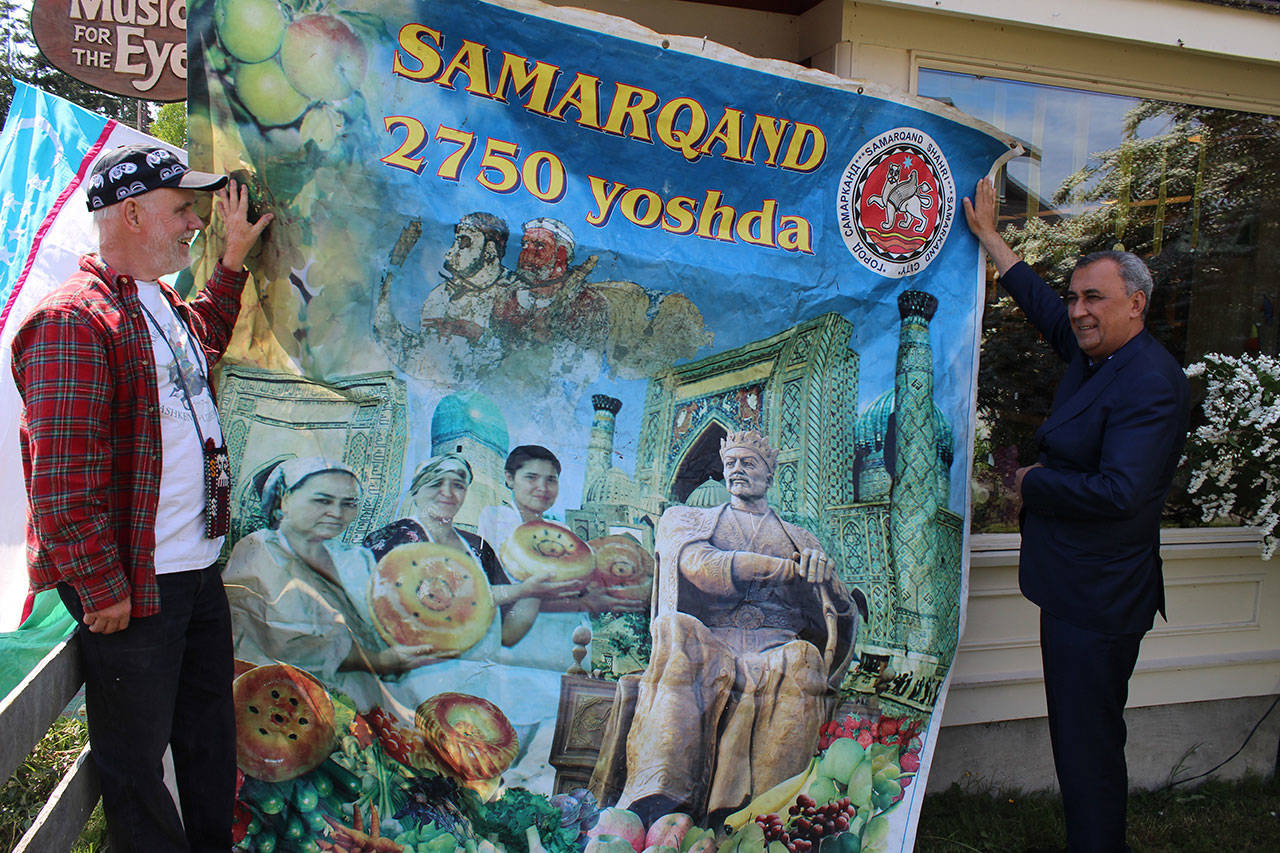Toza.
The word came up again and again from the Uzbekistan visitors as they looked around Langley.
It means “clean” in Uzbek.
“It’s very beautiful, clean, so clean and very quiet and very peaceful,” said Erkin Yakubov, the mayor of Khiva, a city of 600,000 in the former Soviet republic. “And the pizza was really delicious.”
Elmurad Kasym, who lives in Denver and works as an interpreter, translated Tuesday for Yakubov and three other officials from Tashkent and Samarkand, cities within Uzbekistan that gained independence following the 1991 breakup of the Soviet Union.
Learning about tourism was the group’s main mission as they took in sights around Langley and Seattle after a brief visit to Washington, D.C.
They traveled as part of the program, Open World, which sponsors exchange programs with post-Soviet-era countries. The Open World Leadership Center was established by U.S. Congress in 1999 to conduct exchanges with present and future leaders of emerging nations.
The Seattle-Tashkent Sister City Association, established 45 years ago as a cultural learning exchange program, hosted the group and arranged various meetings with tourist and hospitality organizations, such as Rick Steves’ Europe Travel Center and the Trade Development Alliance of Greater Seattle.
“The secret to having a successful relationship like this is to be as apolitical as possible,” said Dan Peterson, former president of the Seattle-Tashkent sister group that was the first U.S. city to establish a connection with a Soviet city. “It is cultural and citizen diplomacy and it works.”
Sitting around a table at Langley’s Chamber of Commerce, delegates skimmed through tourist brochures and magazines while listening to Executive Director Inge Morascini.
Dreams.
That’s what sells the Village by the Sea, she said.
And memories.
“It is nostalgia,” Morascini said. “It is the place people remember as a child, with the small shops, the narrow streets, a kinder, gentler place.”
Kasym, who speaks four languages, English, Russian, Uzbek and Turkish, listened intently and spontaneously translated as Morascini spoke.
But some things just didn’t translate, such as survey monkey, VRBO and parades for whales. But what really tripped him up was the Whidbey slogan: “Drive off the mainland for a visit to our island.”
Puzzled, Kasym replied in his best American-ese: “Could you stop with the curve balls, man?”
Furqat Rakhimov is the mayor of Samarkand, located on the crossroads of Europe and Asia and a center of trade for thousands of years.
Asked what attributes might attract tourists to his city, he replied “our amazing history, architecture and amazing food.”
This past spring, a similar Uzbekistan delegation visited Seattle and Langley.
Upon spotting Langley’s famous population of escaped domestic rabbits, they remarked that residents were lucky to have dinner so close by.
Langley business owner Fred Lundahl, who speaks Uzbek, explained the origin of the bothersome bunnies. He described Langley as “a town of rabbit huggers, similar to tree huggers.” The visitors responded that they lived in a country full of rabbit eaters.
“So they were trying to catch them because our rabbits look slow and fat,” Landahl laughed. “But the rabbits haven’t survived 20 years by being caught by kids or visitors from Uzbekistan.”
Tuesday, no reports of rabbit-wrangling came in.
Helping with translation was Dillorom Abdulloeva, a lawyer specializing in international human rights. Years ago, she was an Uzbekistan exchange student at Bothell High School.
After attending graduate school and working in Washington D.C., Abdulloeva moved backed to Bothell. She missed the mountains, the Sound and green scenes of the Northwest.
“I like the nature here and it’s very close to the water,” she said. “Uzbekistan is a double landlocked country. Water is a huge thing for us to see. Much of the country is a hot desert valley.”
They also visited Music to the Eyes, Lundahl’s unusual business that houses a colorful and eclectic collection of textiles, beads, jewelry, hats and clothing from Eurasia.
Fred and his wife Sharon Lundahl spent decades living and working for the U.S. State Department in Africa, Asia and former Soviet republics. They frequently return to Uzbekistan and Tajikistan to buy merchandise for their store. Lundahl is also on the board of the Seattle-Tashkent Sister City Association and will lead a tour to Uzbekistan this fall to celebrate 45 years of friendship.
Walking toward Music For the Eyes, the visiting delegates spotted the turquoise, green and white flag of Uzbekistan flying outside the store. A huge banner advertising the Silk Road city of Samarkand also fluttered on the side of the store, which is the century-old home of Maggie McLeod, mayor of Langley in the 1920s.
Rakhimov, the mayor of Samarkand, who just happened to be studying tourism in the Village by the Sea, grinned, laughed and wrapped himself in the banner. He signaled Lundahl to join him and the two chatted in a language seldom heard on Whidbey Island.
Words that needed no translation.



